|
|
|
Sort Order |
|
|
|
Items / Page
|
|
|
|
|
|
|
| Srl | Item |
| 1 |
ID:
174551
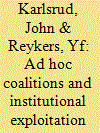

|
|
|
|
|
| Summary/Abstract |
While the increasingly thick web of global, regional and sub-regional security arrangements and institutions has received ample scholarly attention, the phenomenon of ad hoc military coalitions and how they impact these institutions has been relatively little explored. We examine ad hoc coalitions in international security responses and develop a tentative typology of military responses that takes ad hoc coalitions into consideration, where we differentiate in terms of institutionalisation and duration. Following a rational-choice institutionalist logic, we argue that institutional proliferation increases the chances of institutional exploitation. We illustrate this with how states apply a pick-and-choose approach in which institutional products but not frameworks are used. They use the interoperable forces, a common culture and mainstreamed doctrine, but not the formal deployment of rapid response mechanisms of eg the North Atlantic Treaty Organization and the African Union. In closing, we observe that institutional proliferation in international security facilitates a functionalist approach mainly inspired by national self-interest. Future research should examine whether this could result in dwindling relevance of international institutions, first in the domain of security, but later also in other domains.
|
|
|
|
|
|
|
|
|
|
|
|
|
|
|
|
| 2 |
ID:
149284
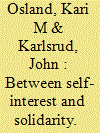

|
|
|
|
|
| Summary/Abstract |
Norway has been a firm supporter of, and contributor to, UN peacekeeping operations. However, while increasing its financial support since the end of the Cold War, Norway has significantly downscaled its troop contributions to the UN, focusing on NATO operations. Rather than interpreting this as lessened interest in the UN, we point out that support and commitment cannot be measured solely in numbers of troops deployed. Norway’s commitment to UN peacekeeping should be understood as part of its strategic culture, here read as a synthesis between self-interest and solidarity, and between the UN and NATO. This article details the institutional, political and material challenges and opportunities for renewed engagement in UN peacekeeping.
|
|
|
|
|
|
|
|
|
|
|
|
|
|
|
|
| 3 |
ID:
164367
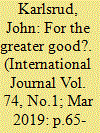

|
|
|
|
|
| Summary/Abstract |
The usual suspects of middle power internationalism—small and middle powers such as Canada, Denmark, Norway, the Netherlands, and Sweden—have all contributed to the UN peacekeeping mission in Mali (MINUSMA). This article argues that while these and other Western countries' contributions to MINUSMA may still be characterized as investments into UN peacekeeping reform and a rule-governed world order, the liberal underpinnings of that commitment are withering. Instead, these countries seek to enhance their own status. This is done by gaining appreciation for their contributions, primarily from the US; strengthening their bids for a non-permanent seat on the UN Security Council; and self-interested contributions to reform UN peacekeeping by efforts to enable it to confront violent extremism and terrorism. Paradoxically, the article concludes, when moving the UN towards counterterrorism and weakening the legitimacy of the organization, Western states undermine a cornerstone of their own security.
|
|
|
|
|
|
|
|
|
|
|
|
|
|
|
|
| 4 |
ID:
170278
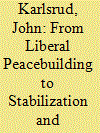

|
|
|
|
|
| Summary/Abstract |
Since the end of the Cold War, international interventions have increasingly been deployed to deal with internal conflict. Liberal peacebuilding has been a guiding concept for many of these interventions, in particular those deployed by the UN. This article argues that liberal peacebuilding is waning in importance, both as a guiding concept and in practice. After long engagements in Afghanistan and the enduring effects of the financial crisis, Western states are shifting their strategy from liberal peacebuilding to stabilization and counterterrorism. In Africa, regional ad hoc coalitions set up to fight terrorists and other armed groups are on the rise, and progressively included in UN peacekeeping operations. To examine these shifts more closely, the article focuses on the crisis in Mali since 2012 and the growing Western security presence in neighbouring Niger. The article concludes that the turn from liberal peacebuilding to stabilization and counterterrorism is likely to be counterproductive, as it will lead to more oppressive governments and more disillusioned people joining the ranks of opposition and terrorist groups, as well as undermine the UN in general and UN peace operations in particular.
|
|
|
|
|
|
|
|
|
|
|
|
|
|
|
|
| 5 |
ID:
156088


|
|
|
|
|
| Summary/Abstract |
Military rapid response mechanisms are generally understood as troops that are on standby, ready to be deployed to a crisis within a short time frame. Yet, the overall track record of the existing multinational rapid response mechanisms within the European Union, the African Union, and North Atlantic Treaty Organization remains disappointing, and the United Nations does not even have a rapidly deployable capacity anymore. Meanwhile, despite that calls for the further development of these mechanisms are still being voiced politically, scholarly literature remains fragmented. This is problematic as many of the obstacles faced by these organizations are similar. This forum uniquely compares experiences from the four aforementioned organizations. Drawing on these insights, this introductory article identifies some key factors that hamper or enable the development and deployment of multinational rapid response mechanisms.
|
|
|
|
|
|
|
|
|
|
|
|
|
|
|
|
| 6 |
ID:
165111


|
|
|
|
|
| Summary/Abstract |
In spite of being a multi-billion-dollar undertaking fundamentally reshaping the lives of people around the world, UN peacekeeping has only recently started to attract scholarly attention among a broader audience. While the evolution of norms and practices in other international organizations, such as the World Bank, the IMF, or the UNHCR, has been extensively analyzed, the transformation of peacekeeping operations has been no less significant.
|
|
|
|
|
|
|
|
|
|
|
|
|
|
|
|
| 7 |
ID:
125378


|
|
|
|
|
| Publication |
2013.
|
| Summary/Abstract |
The literature has generally not grappled with complex decision making structure within organizations like the UN. Special representative of the secretary- General can act as norm arbitrators in the UN System generating new practice by weighing against each other the conflicting norms that guide peacekeeping. Practices from the field, crystallized through the actions of SRSGs, Constitute a bottom-up source of influence on UN norm change processes. SRSGs enjoy relative independence and physical distance from UN headquarters. With background often from diplomatic careers, plus relative autonomy and interpretations of the UN, They can wield influence thank to a certain level of decentralized authority and their personal prestige.
|
|
|
|
|
|
|
|
|
|
|
|
|
|
|
|
| 8 |
ID:
152791


|
|
|
|
|
| Summary/Abstract |
The United Nations (UN) peacekeeping operation in Mali (MINUSMA) has become among the deadliest in UN history, suffering from attacks by violent extremists and terrorists. There are strong calls to give UN peacekeeping operations more robust mandates and equip them with the necessary capabilities, guidelines and training to be able to take on limited stabilisation and counter-terrorism tasks. This article conceptually develops UN counter-terrorism operations as a heuristic device, and compares this with the mandate and practices of MINUSMA. It examines the related implications of this development, and concludes that while there may be good practical as well as short-term political reasons for moving in this direction, the shift towards UN counter-terrorism operations will undermine the UN’s international legitimacy, its role as an impartial conflict arbiter, and its tools in the peace and security toolbox more broadly, such as UN peacekeeping operations and special political missions.
|
|
|
|
|
|
|
|
|
|
|
|
|
|
|
|
| 9 |
ID:
121423
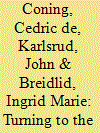

|
|
|
| 10 |
ID:
137069


|
|
|
|
|
| Summary/Abstract |
The UN peacekeeping operations in the Central African Republic (CAR), Democratic Republic of Congo (DRC) and Mali were in 2013 given peace enforcement mandates, ordering them to use all necessary measures to ‘neutralise’ and ‘disarm’ identified groups in the eastern DRC and to ‘stabilise’ CAR and northern Mali. It is not new that UN missions have mandates authorising the use of force, but these have normally not specified enemies and have been of short duration. This article investigates these missions to better understand the short- and long-term consequences, in terms of the willingness of traditional as well as Western troop contributors to provide troops, and of the perception of the missions by host states, neighbouring states, rebel groups, and humanitarian and human rights actors. The paper explores normative, security and legitimacy implications of the expanded will of the UN to use force in peacekeeping operations. It argues that the urge to equip UN peacekeeping operations with enforcement mandates that target particular groups has significant long-term implications for the UN and its role as an impartial arbitrator in post-conflict countries.
|
|
|
|
|
|
|
|
|
|
|
|
|
|
|
|
| 11 |
ID:
123997
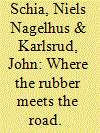

|
|
|
|
|
| Publication |
2013.
|
| Summary/Abstract |
Peacebuilding actors have been heavily criticized for being postcolonial, orientalist and mired in a Western rationality, causing a gap between needs on the ground and the means provided, and resulting in poor delivery. From recent fieldwork in Liberia, Haiti and South Sudan we argue that while there is merit to much of this critique, there is also a will to analyse and understand the local political economy and how international actors become a part of it, but that peacebuilding tends to fall victim to conflicting power structures within the UN and between international actors, as well as to the lack of application of acquired knowledge and cumbersome processes.
|
|
|
|
|
|
|
|
|
|
|
|
|
|
|
|
|
|
|
|
|